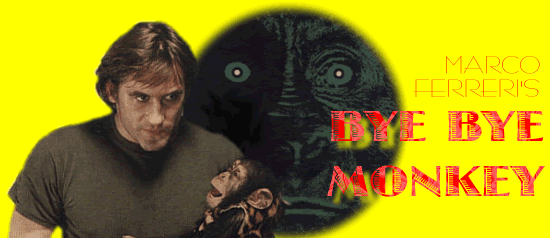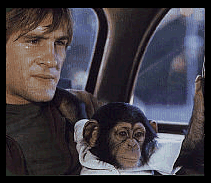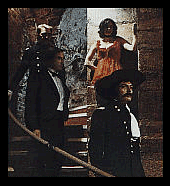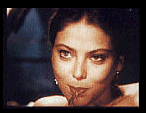

Color, 1977, 94 mins. Directed by Marco Ferreri
Starring Gerard Depardieu, Marcello Mastroianni, James Coco, Gail Lawrence, Geraldine Fitzgerald, Stefania Casini, Mimsy Farmer / Written by Marco Ferreri and Gerard Brach / Produced by Giorgrio Norcella and Maurice Bernart / Music by Philippe Sarde / Cinematography by Luciano Tovoli
Format: DVD - Image / Sceneries (MSRP $24.95)
Letterboxed (1.75:1) / Dolby Digital Mono
You just know you're in for a weird ride with any movie opening up with Gerard Depardieu being consensually raped by a militant feminist theatrical troupe led by Italian cinema starlets Mimsy Farmer (Four Flies on Grey Velvet, Autopsy) and Stefania Casini (Suspiria, Andy Warhol's Dracula). Sure enough, this is one hour and a half guaranteed to leave most viewers speechless, either in awe or horror.
After the aforementioned opener, aging down and out Luigi (Marcello Mastroianni) stumbles upon the giant dead body of an ape in the middle of a deserted area in New York City (the remnants of Dino De Laurentiis' finale from King Kong, so the rumor goes). Cradled in the dead ape's arms is a young baby monkey, whom the young but jaded Lafayette (Depardieu) decides to adopt as his own baby girl. Lafayette and his American girlfriend (Deborah Foreman look-alike Gail Lawrence) find their already unusual relationship further distorted by this bizarre attempt at parenthood, and Lafayette turns to the quirky Flaxman (James Coco!) for advice about how to deal with what is apparently a collapsing futuristic social state.
Continuing his study of gender roles from such films as The Ape Woman, Ferreri's view of humanity here is unlike any other filmmaker's. His perception of the next step of man's evolution is a conciliation between bestial and intellectual, sexual and spiritual, though his own idiosyncratic traits (twisted humor, graphic nudity, and unexpected tragedy) may make the message a bit hard to swallow for the uninitiated. Image's presentation of Bye Bye Monkey is the most attractive so far in their series of Ferreri releases; though derived from the same Cinecitta print used for the PAL release overseas, this looks better than ever, with amazingly punchy colors for a mid-'70s low budget European release. Even scenes bathed entirely in strong red lighting come through legibly, and the English-recorded soundtrack (a rarity for Ferreri) sounds just fine. As usual, Philippe Sarde provides a fine, emotionally trenchant music score, and Luciano Tovoli's typically top notch cinematography adds a firm sense of visual style to Ferreri's amusing and often upsetting dissection of mankind's inevitable destructive impulses.
Color, 1974, 109 mins.
Directed by Marco Ferreri
Starring Marcello Mastroianni, Catherine Deneuve, Ugo Tognazzi, Michel Piccoli, Philippe Noiret, Alain Cuny / Written by Marco Ferreri & Rafael Azcona / Produced by Jean Yanne / Music by Philippe Sarde / Cinematography by Etienne Becker
Format: DVD - Image / Sceneries (MSRP $24.95)
Letterboxed (1.75:1) / Dolby Digital Mono
This movie is nuts! Marco Ferreri's bizarre modern "western," Don't Touch the White Woman (Touche Pas La Femme Blanche), was never given an official U.S. release, and it's easy to see why. Taking political commentary to radical extremes, Ferreri presents the familiar story of Custer's Last Stand, now set in mid-'70s Paris. Some characters wear period clothes, while others are garbed in sweatshirts or business suits. Indians remain in native clothes and wander around the outskirts of Paris while Custer (a fabulously self-indulgent performance by Marcello Mastroianni) plots their extermination. Characters constantly refer to President Nixon (whose portrait appears with amusing frequency in the background) as the force behind the white men's plot, making this a sort of twisted allegory for American colonial corruption extending into the Watergate era. Last but not least, the whole disorienting experience climaxes with an elaborate, spectacularly gory recreation of Little Big Horn that comes off like Soldier Blue as reinterpreted by Mel Brooks at the end of Blazing Saddles.
General George Armstrong Custer is called in to lead the American troops in a mission decreed by God to wipe the Indians from their native land and claim the territory for the white men. A patriotic, well to do young woman (Catherine Deneuve) flirts with Custer and eventually goes to his bed the night before battle, while Custer's disgruntled Indian sidekick (Ugo Tognazzi, a Ferreri regular) constantly attempts to make passes at Deneuve and picks up white prostitutes to satisfy his strange porcelain lust. Image has done as good a job as can be expected with this film, which is presented full frame except for the letterboxed (1.75:1) opening and closing titles. Aside from a few close ups, the cropping does little damage to the film, and the color is surprisingly vivid and clean. The yellow subtitles are burned onto the image, unfortunately, and are consistently clear and legible. While this film has probably not been preserved under ideal conditions over the years, the Dolby Digital mono soundtrack is surprisingly sharp and distortion-free. Since this is probably the only time this film will ever be available in the U.S. (and it's a miracle we even got this), European cinema followers would be wise to pick it up before the limited pressing runs out.
Color, 1981, 102 mins. Directed by Marco Ferreri
Starring Ben Gazzara, Ornella Muti, Susan Tyrrel, Tanya Lopert / Written by Sergio Amidei, Marco Ferreri & Anthony Foutz, based on Erections, Ejaculations, Exhibitions, and General Tales of Ordinary Madness / Music by Philippe Sarde / Cinematography by Tonino Delli Colli
Format: DVD - Image / Sceneries (MSRP $24.95)
Letterboxed (1.75:1) / Dolby Digital Mono
Years before the writings of boozing philosopher Charles Bukowski reached mainstream cinema (sort of) with Barfly, maverick Italian director Marco Ferreri tackled the same subject with Tales of Ordinary Madness, an Italian-French coproduction that was apparently Ferreri's bid for mainstream acceptance. However, even streamlined Ferreri is still pretty bizarre; though set mostly in Los Angeles, the interiors were shot at Cinecitta and have a weird, color coordinated, sleazy splendor. When most European directors do their exterior shooting in America, they have a way of making everything look really off-kilter (e.g., Antonioni's Zabriskie Point), and this is no exception. Ferreri visually transforms the California streets into a sundrenched, decaying series of asphalt tombs, and the people who pass on them are all basically trying to inflict any emotional shocks upon themselves to remind them of what it feels like to be alive. Chief among them is our protagonist, Charles Serking (Ben Gazzara), a thinly diguised Bukowski stand-in, who drifts along between various bars and women as he spouts cynical poetry.
After delivering a booze-ridden speech at the opening, Serking escorts the viewer on a little tour of L.A. which first involves him spying a punk-blond woman (Susan Tyrrel) on the beach, and, noting "she had an ass like a wild animal," he follows her back to her apartment and rapes her (with her consent, oddly enough). Obviously this is not a film for everybody, but if you're curious about Ferreri, this is as good a place to start as any. While it lacks the consistent outrageousness of his masterpiece La Grande Bouffe, Tales is firmly anchored by Gazzara's authoritative and often devastating performance. His years of cutting teeth on Cassavettes films definitely served him well, and he has some truly great moments. The most memorable bit involves Serking's half-hearted attempt at getting a desk job at an office. where he can't resist the urge to start pelting his fellow coworkers in their cubicles with beer cans. As Ferreri's female icon of choice in this film, Muti looks fantastic as always and manages some nice dramatic moments; it's also nice to hear her speaking with her own voice for a change instead of the usual post-synch dubbing. Ferreri keeps a surprising grip on the material (he adapted it himself along with Sergio Amidei and Anthony Foutz), aided by Tonino Delli Colli's evocative photography and a delicate, restrained score by Philippe Sarde, obviously written around the same time as Tess. Image's transfer is quite attractive, with vivid, clean colors that far surpass the mediocre VHS releases this received in the early '80s. While the print appears to be complete, its running time clocks in a bit shorter than the reference time of 107 minutes, indicating this may have been taken from a time-compressed PAL master. If so, it certainly doesn't show. The DVD is a nice presentation of a title you'd never expect to receive such a pristine transfer, and the outstanding packaging design, including an elegant (and erotic) cover design and concise, well-written liner notes, is the icing on the cake.
Mondo Digital MainPage |
Mondo Digital Vault |
LaserLogue |
ScoreLogue For an interesting double feature, check this out along with Nagisa Oshima's neglected masterpiece, Max Mon Amour, in which the nuclear family is splintered by the initiation of a monkey into the human circle.
For an interesting double feature, check this out along with Nagisa Oshima's neglected masterpiece, Max Mon Amour, in which the nuclear family is splintered by the initiation of a monkey into the human circle.

 Custer often utters the title phrase to discourage his "lowly" Indian, leading to a sick little punchline during the finale. Meanwhile, Custer is antagonized by the flamboyant Buffalo Bill (a scene-stealing Michel Piccoli), and French singers continuously warble C&W tunes in the background to add to the surreal effect. Obviously this is not a film for all tastes; even viewers accustomed to Ferreri's bizarre pacing and visual quirks may find this tough going, as the film outstays its welcome by a good 15 minutes at least. However, from a satirical standpoint, Don't Touch is a fascinating, idiosyncratic work that could only have come from Europe during the '70s. The cast seems to be having a ball, though Deneuve has far too little screen time. Philippe Sarde's eccentric score, which ranges from romantic to incredibly disturbing, is unlike anything else in his musical canon.
Custer often utters the title phrase to discourage his "lowly" Indian, leading to a sick little punchline during the finale. Meanwhile, Custer is antagonized by the flamboyant Buffalo Bill (a scene-stealing Michel Piccoli), and French singers continuously warble C&W tunes in the background to add to the surreal effect. Obviously this is not a film for all tastes; even viewers accustomed to Ferreri's bizarre pacing and visual quirks may find this tough going, as the film outstays its welcome by a good 15 minutes at least. However, from a satirical standpoint, Don't Touch is a fascinating, idiosyncratic work that could only have come from Europe during the '70s. The cast seems to be having a ball, though Deneuve has far too little screen time. Philippe Sarde's eccentric score, which ranges from romantic to incredibly disturbing, is unlike anything else in his musical canon.

 Tyrrell's roles tend to be bizarre, and this is no exception. She calls the cops on Serking while he's taking a bath, causing him to intone, "She chewed me up like an enchilada and spit me into a police car." Undeterred, Serking winds up catching the eye of masochistic, beautiful barfly Ornella Muti (also in Ferreri's startling The Last Woman and most familiar to U.S. viewers as Princess Aura in 1980's Flash Gordon). After she performs an impromptu cheek-piercing at a bar, Serking decides he'd better go home with this woman, and they sort of fall in love. It all ends badly, however, so Serking goes back and falls into the arms of Tyrrell's obese landlady (don't ask). Ah, but there's more! Eventually he and Muti get back together and go off to a beachhouse where there share a few idyllic moments; Muti falls apart, however, and performs a very nasty act of sexual self-mutilation (a recurring Ferreri motif) that sends him fleeing in dismay.
Tyrrell's roles tend to be bizarre, and this is no exception. She calls the cops on Serking while he's taking a bath, causing him to intone, "She chewed me up like an enchilada and spit me into a police car." Undeterred, Serking winds up catching the eye of masochistic, beautiful barfly Ornella Muti (also in Ferreri's startling The Last Woman and most familiar to U.S. viewers as Princess Aura in 1980's Flash Gordon). After she performs an impromptu cheek-piercing at a bar, Serking decides he'd better go home with this woman, and they sort of fall in love. It all ends badly, however, so Serking goes back and falls into the arms of Tyrrell's obese landlady (don't ask). Ah, but there's more! Eventually he and Muti get back together and go off to a beachhouse where there share a few idyllic moments; Muti falls apart, however, and performs a very nasty act of sexual self-mutilation (a recurring Ferreri motif) that sends him fleeing in dismay.